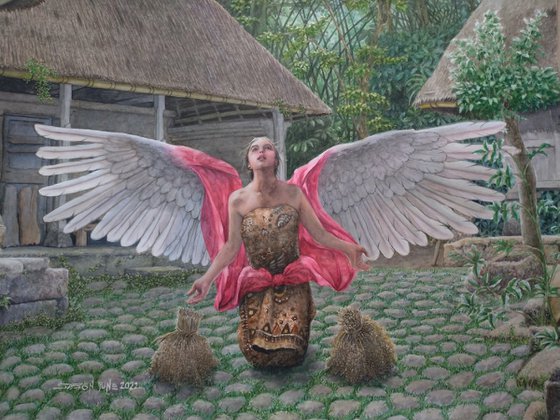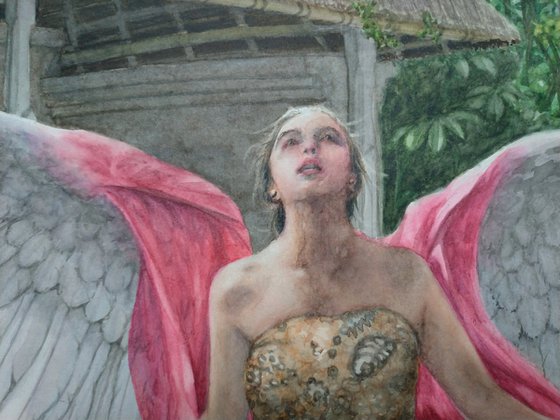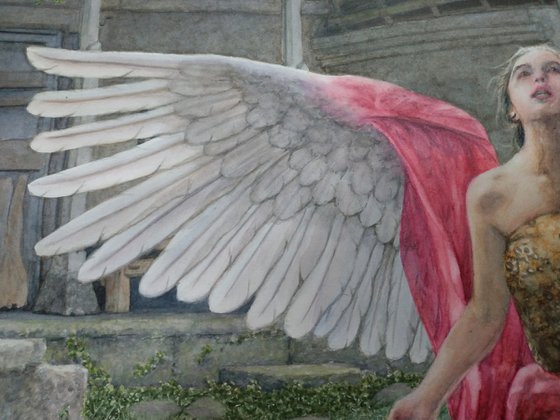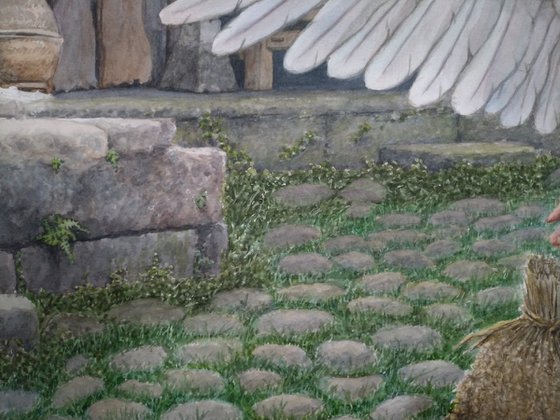- By medium
- By subject
- By budget
- Sales
- Gift cards
- Discover all art
- Artists
- Editors’ picks
- Ideas
Original artwork description:
One of Eight my painting series about Indonesia folklore. Size 76cm 56cm. in Realistic Decorative Style.
Jaka Tarub was a young man who, as the legend said, would later be the patriach of Central Java's Kingdom of Mataram (1588—1681) through his daughter, Retno Nawangsih. As common with any legends, the story of Jaka Tarub has many versions but the core of the story is the same. This story is written in Babad Tanah Jawi, an old manuscript which chronicles the history of The Kingdom of Mataram (in Java Indonesia).
The legend
It was said that somewhere in Dadapan Village there was a pond where apsaras descended from heaven to take a bath.
Jaka Tarub was a young man who lived in a small village. One day, he was hunting for a deer in Dadapan Village but he did not find any deer. While searching fo a deer, he heard the sound of girls laughing. As the place is deep inside the forest, Jaka Tarub wondered why there were girls there. He followed the sound and arrived at a small pond where he saw seven apsaras descended from heaven to take a bath. The apsaras looked like young girls and were very beautiful.
While the apsaras were bathing, Jaka sneaked out and took one of the shawls lying on a rock nearest to him and went back into hiding. He watched as the apsaras were chatting among themselves while bathing. After they finished bathing and getting dressed, one of the apsaras, the youngest and the most beautiful of all, looked puzzled because she could not find her shawl, which was stolen by Jaka. Without her shawl, she could not fly back to heaven. Jaka heard the other apsaras called her Nawang Wulan while they told her that it was getting late and they had to return to heaven so could not stay with her to look for her shawl. After the other apsaras had gone, Jaka Tarub showed himself and pretended to offer his help.
The trustful Nawang Wulan agreed to go with Jaka Tarub to his home. Eventually the two fell in love and got married. It turned out that Nawang Wulan was a good wife and was very skillfull in doing house chores without making much effort. Moreover, their rice supply seems like never decreased after he married her. But Nawang Wulan forbade Jaka to look inside the rice cooker while she cooked rice.
Not long after, Nawang Wulan got pregnant and at due time she gave birth to a baby girl whom they named Nawangsih. Now, added with the task of taking care of a baby, Nawang Wulan still seems to have no difficulties in doing her house chores, while most other woman would have some difficulties in doing all she did.
Feeling very curious about all these, Jaka tried to find out her secret. He did what Nawang Wulan forbid him to do. He opened the lid of the rice cooker and looked inside it. He found out that Nawang Wulan only used one single grain of rice to cook into a full rice cooker. Now he knew why their rice supply was never decreased and that all these times Nawang Wulan had been using her apsara powers to do house chores.
But something happened after Jaka peeked inside the rice cooker. Nawang Wulan began to have various difficulties in doing her tasks. Furthermore, their rice supply began to decrease. Nawang Wulan had lost her apsara powers and became an ordinary human being.
When their rice supply was nearly used up, Nawang Wulan unintentionally saw her old shawl lurking from below their rice supply while she went to the granary to get some rice. To her surprise, she found out that it was Jaka who stole her shawl all along, which made her could not go back to heaven. She was angry, and now that she had find her shawl, she decided to return to heaven. Jaka pleaded her not to leave, but her decision was final.
But before she went, Nawang Wulan asked Jaka to build a hut outside their house and told him to leave Nawangsih there every night, and that he should never look inside the hut while she was there to nurse the baby. Since then Jaka took Nawangsih to the hut every night until she grew up. Nawang Wulan always cared for her family from heaven and always provided help for her family when they needed it.
Materials used:
Watercolor on Paper
Tags:
#woman #angel #folkloreNawang Wulan's Return (2022) Watercolour
by Kus Hendradi Laksono
£1,500
- Watercolour on Paper
- One of a kind artwork
- Size: 76 x 56cm (unframed) / 76 x 56cm (actual image size)
- Signed on the front
- Style: Illustrative
- Subject: People and portraits
Loading
Original artwork description
One of Eight my painting series about Indonesia folklore. Size 76cm 56cm. in Realistic Decorative Style.
Jaka Tarub was a young man who, as the legend said, would later be the patriach of Central Java's Kingdom of Mataram (1588—1681) through his daughter, Retno Nawangsih. As common with any legends, the story of Jaka Tarub has many versions but the core of the story is the same. This story is written in Babad Tanah Jawi, an old manuscript which chronicles the history of The Kingdom of Mataram (in Java Indonesia).
The legend
It was said that somewhere in Dadapan Village there was a pond where apsaras descended from heaven to take a bath.
Jaka Tarub was a young man who lived in a small village. One day, he was hunting for a deer in Dadapan Village but he did not find any deer. While searching fo a deer, he heard the sound of girls laughing. As the place is deep inside the forest, Jaka Tarub wondered why there were girls there. He followed the sound and arrived at a small pond where he saw seven apsaras descended from heaven to take a bath. The apsaras looked like young girls and were very beautiful.
While the apsaras were bathing, Jaka sneaked out and took one of the shawls lying on a rock nearest to him and went back into hiding. He watched as the apsaras were chatting among themselves while bathing. After they finished bathing and getting dressed, one of the apsaras, the youngest and the most beautiful of all, looked puzzled because she could not find her shawl, which was stolen by Jaka. Without her shawl, she could not fly back to heaven. Jaka heard the other apsaras called her Nawang Wulan while they told her that it was getting late and they had to return to heaven so could not stay with her to look for her shawl. After the other apsaras had gone, Jaka Tarub showed himself and pretended to offer his help.
The trustful Nawang Wulan agreed to go with Jaka Tarub to his home. Eventually the two fell in love and got married. It turned out that Nawang Wulan was a good wife and was very skillfull in doing house chores without making much effort. Moreover, their rice supply seems like never decreased after he married her. But Nawang Wulan forbade Jaka to look inside the rice cooker while she cooked rice.
Not long after, Nawang Wulan got pregnant and at due time she gave birth to a baby girl whom they named Nawangsih. Now, added with the task of taking care of a baby, Nawang Wulan still seems to have no difficulties in doing her house chores, while most other woman would have some difficulties in doing all she did.
Feeling very curious about all these, Jaka tried to find out her secret. He did what Nawang Wulan forbid him to do. He opened the lid of the rice cooker and looked inside it. He found out that Nawang Wulan only used one single grain of rice to cook into a full rice cooker. Now he knew why their rice supply was never decreased and that all these times Nawang Wulan had been using her apsara powers to do house chores.
But something happened after Jaka peeked inside the rice cooker. Nawang Wulan began to have various difficulties in doing her tasks. Furthermore, their rice supply began to decrease. Nawang Wulan had lost her apsara powers and became an ordinary human being.
When their rice supply was nearly used up, Nawang Wulan unintentionally saw her old shawl lurking from below their rice supply while she went to the granary to get some rice. To her surprise, she found out that it was Jaka who stole her shawl all along, which made her could not go back to heaven. She was angry, and now that she had find her shawl, she decided to return to heaven. Jaka pleaded her not to leave, but her decision was final.
But before she went, Nawang Wulan asked Jaka to build a hut outside their house and told him to leave Nawangsih there every night, and that he should never look inside the hut while she was there to nurse the baby. Since then Jaka took Nawangsih to the hut every night until she grew up. Nawang Wulan always cared for her family from heaven and always provided help for her family when they needed it.
Materials used:
Watercolor on Paper
Tags:
#woman #angel #folklore14 day money back guaranteeLearn more




